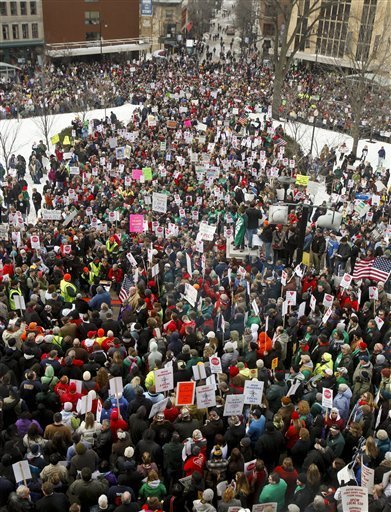Embodied Voices and the Protests in Madison
 A core principle of democracy is that decisions ought to be guided by the “voice of the people.” But what is the people’s voice? And how do the people speak? As citizens living in the United States and other democracies know well, contemporary news media present the people’s voice in a familiar form: the opinion poll. Fifty percent of the people believe this. Forty percent disagree with that. People appear as percentages, even when real live bodies beg to differ. In my most recent book, I describe how federal policymakers turned to pollsters to determine their constituents views on Social Security, even in situations where constituents packed committee hearing rooms to have their voices heard.
A core principle of democracy is that decisions ought to be guided by the “voice of the people.” But what is the people’s voice? And how do the people speak? As citizens living in the United States and other democracies know well, contemporary news media present the people’s voice in a familiar form: the opinion poll. Fifty percent of the people believe this. Forty percent disagree with that. People appear as percentages, even when real live bodies beg to differ. In my most recent book, I describe how federal policymakers turned to pollsters to determine their constituents views on Social Security, even in situations where constituents packed committee hearing rooms to have their voices heard.
The protests in Madison have demonstrated forcefully the power of an alternative to the opinion poll, an embodied voice of the people. During the past week, policymakers, news commentators, and citizens alike have looked to the protests as a sign of public sentiment. And the protests are having a positive effect! I remember first hearing about the planned protests this past Monday. I was depressed about Walker’s proposals, and had resigned myself to the bill’s passage. I had planned on attending the protests out of a sense of moral obligation, but I didn’t expect any change in the outcome.
Five days later, the bill still may pass, but the possibility of its defeat has gone from non-existent to a chance—a chance that tens of thousands of Wisconsinites are fighting for. And they’re fighting by showing up at the Capitol to march, carry signs, chant, and register their dissent.
The people’s voice, resonating loudly from the halls of the Capitol and the streets outside, is inspiring their representatives to act. As readers of this blog may know, the fourteen Democratic senators who left the state Thursday to deny the Senate a quorum did so spontaneously as they gathered on the lawn of the Capitol that morning. One senator was quoted as saying that seeing so many Wisconsinites out in protests for several days convinced him that he could not abide by business as usual. In subsequent interviews, other members of the fourteen have called the protesters heroes, and they clearly seem to draw considerable energy from the people. What if no one was outside the Capitol? Or just a few hundred? What if the senators had commissioned an overnight poll showing that state workers opposed Walker’s plan, but state workers and others didn’t show up to make their dissent known? Would the senators have been inspired to such dramatic action? I don’t think so.
In my view, the reason that the bill wasn’t passed on Friday as originally expected is because tens of thousands of Wisconsinites embodied their dissent in the capital city. And their representatives followed their lead (hat tip to Sue Robinson for calling this point to my attention). By leaving the state, the Democratic senators spoke with an embodied voice that would not have been possible in their chamber. I’m a scholar of deliberation and true-believer in its transformative power. But, on this occasion, no matter what arguments the Democrats would have put forward, they likely would have been defeated on a party-line vote. Physically relocating their bodies enabled the Senators to express their opinions and to prevent a vote. And they did so, as several of them have suggested, so that their colleagues could hear the voice of the people.
To be sure, the situation bringing about these protests in Madison is depressing, since Walker’s bill seems to be designed more to inflict pain than save money. But the protests are inspiring, heartening, motivating. They are a tremendously eloquent statement about the power of democracy. Behold the voice of the people!


